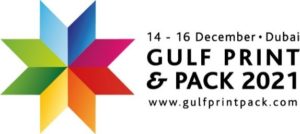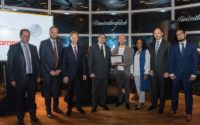Gulf Print & Pack Hosts First Virtual Industry Round Table
Tarsus Group, the organizer of Gulf Print & Pack 2021, recently hosted the first in a series of virtual round table discussions with top representatives from the label and package printing industry in the Middle East.
Aimed at keeping the region’s industry connected in the months leading up to the show, the first session, “Label and package printing in the MEA region – new technologies and overcoming the challenges”, took place on Wednesday 14 October and examined the impact of the COVID-19 pandemic on the region’s industry. This included how individual businesses had been affected, the lasting changes, how the industry has identified new markets and opportunities, label and package printing trends in the region, and sustainability.
Six panelists took part in the lively discussion. Representing leading MEA suppliers were: Roger Nicodeme, general manager, Heidelberg Gulf; Shyam Babu, director, Nilpeter Middle East; Hassan Kittaneh, MD, Multisystems Technology (LabelGraff); Pankaj Patel, CEO, PrinTech Middle East (OMET & Prati); and Jay Chawda, MEA strategic consultant – Labels Division, PrinTech. They were joined by Vinesh Bhimani, owner of printing company Kimoha Entrepreneurs Ltd. Andy Thomas-Emans, strategic director, Labelexpo, chaired the session.
Overall, panelists agreed that while the pandemic had affected everyone, and commercial printing in particular, it had created positive opportunities to diversify, explore digital label and package printing technology, bring local label and package printing suppliers to the table, and new ways of working or engaging with customers. These factors had helped the industry move forward in recent months, especially in the cosmetics segment and retail. Kittaneh highlighted the positive impact of the growth of small start-up digital labeling businesses, which is bringing new players to the market and fuelling demand for personalisation and short runs. He urged the industry to start focusing on these, and start marketing and selling online.
The panel also agreed that among the most notable permanent changes was service support and maintenance done increasingly via software and online. Nicodeme also highlighted that they had successfully completed customer installations via Zoom meetings for the first time. Both Patel and Kittaneh noted that the pandemic had enabled their businesses to grow online and increase training opportunities such as webinars.
From the printer perspective, Bhimani said that Kimoha had benefited from being an acknowledged essential business in Dubai’s Jebel Ali Free Zone, and had even been able to expand, with on-demand jobs increasing and the ability to do digital and flexo together. On digital, Babu agreed that the demand and potential for digital machines is increasing, with Nilpeter’s focus now on short and mid-web production. Nicodeme agreed that there is demand for short-runs, but felt that customer preference right now for packaging is for long runs and in-mould. Babu agreed that customers are focusing on specialised products and large machines for packaging and cartons. In-mould, together with shrink sleeves, were noted by the panel as key local printing trends to watch in the region. Kittaneh also highlighted hybrid as a major growth area, while Babu cited automation and printing on multiple platforms. He drew attention to the fact that machinery needs to be more flexible, smarter and better adapted to multiple materials than ever before, and there’s a move from flexo to digital production as short-run demand increases. Nicodeme agreed that automation can enable higher productivity, now that the current demand is for shorter make-ready time and a longer printing time. Kittaneh suggested that a key challenge in digital label printing is affordable finishing solutions such as laser die cutting. Bhimani noted that for printers, offset and sheet-fed production had decreased significantly in the region, and specialised, hybrid production was key for the future.
The final topic discussed was sustainability. The panel agreed unanimously that this is one of the industry’s biggest priorities right now and also key to the growth of digital printing, which is less wasteful and cleaner than other technology. Chawda cited linerless printing and low migration inks as solutions to watch that will help reduce the label and package printing industry’s environmental footprint in future. Babu reiterated that it’s a 360 degree issue for the entire industry.
Thomas-Emans said of the session: “We are delighted with our very first virtual open discussion with the label and package printing industry in the MEA region. It’s incredibly encouraging to hear that it remains robust, positive, and continues to move forwards in these challenging times. I’d like to thank our panelists for taking part and we look forward to running the next debate in the coming weeks. It’s vitally important that the industry continues to share ideas openly and honestly while we cannot meet face to face, so any supplier or printer keen to take part in future Gulf Print & Pack hosted round table discussions is strongly encouraged to get in touch with us.”
Echoing this, Patel added: “These are challenging times and we are in it together. The only way to succeed is innovate, innovate, innovate what we do and how we do it. This pandemic has taught us interesting new ways to engage with and support our customers, by online meetings, by online and remote installation of machines and training, even maintenance of machines can be done online. We at PrinTech Middle East team are committed to put everything in our power to ensure that printing and packaging community endures this challenging times together. We will try and try until we succeed.”
Babu also agreed. He said: “Business challenges posed by this pandemic were new to all of us, but we could achieve good business. We innovated and adopted online machine demos, online factory acceptance test, extended online machine support and established a state-of-art 24-7 customer service platform, which helped Nilpeter and partners to deal with current times, and becoming a new norm in the future. This region has great potential, and I am certain that we will overcome this challenging time, since change is inevitable.”
Nicodeme added: “Despite all the challenges, the industry is still doing well. Our customers are investing, in offset, in flexo and in digital.”
Bhimani said: “It’s a very challenging time, but a challenging time will not be permanent, it has to go. Be positive.”
The next session will cover the commercial and wide-format printing industry. Future discussions will build on the key trends outlined in the first session, such as: smart use of digital print technologies; security printing; digital inkjet for packaging; sheetfed digital labels; and print automation software. Any supplier or printer interested in taking part should contact bcassim@tarsus.co.uk.
The first virtual round table discussion can be viewed on YouTube at: https://go.labelexpo.com/e/707733/IBLFQ0TyAOM/3fb95b/580594071?h=N0sw3SgYcrymU-K1GuLAIlO88Xlm7ZZn4ly7nVqZwlE.







